§ 1. [INTRODUCTION]
Luís Gonzaga Gomes was born in Macao, on the 11th of July 1907, son of Joaquim Xavier Gomes and Sara Carolina da Encarnação.
His father was a primary school teacher, who later became the Director of the Escola Central do Sexo Masculino (Central School) and is remembered with great respect. It is interesting to note that his name was mentioned in the articles entitled Macau: figuras d'outros tempos (Macao: Personalities of Other Times), published in "Notícias de Macau" on the 13th of August 1967.
Like his father, his mother was also a primary school teacher and she too was dedicated to religious activities which led her to win esteem and consideration among the people that knew her. She rose to be Director of the Escola Central do Sexo Feminino (Central School).
Highly cultured and intellectually refined, the Gomes' family were much esteemed by the society of their time. They lived in an open-minded and cultured atmosphere, where the taste for literature and music was encouraged (it was usual in their home to have poetry readings). When Luís Gomes was a child he learned to play violin with his elder sister, Maria Margarida, who studied music, classical singing and classical ballet in the United States of America.
The Gomes family lived in Monte [Mount borough], in the steep street of the same name, a very pleasant place for its freshness, due to the cluster of trees typical in that zone.
The house of Luís Gomes, (who was known as 'Inho' Gomes by the people in the area) was remembered by those who knew it when they were children, as being very comfortable though not beautiful. In it could be seen his skill and taste as a collector of Chinese art, for it was exhibited in every piece of furniture, an abundance of porcelain wares, bronzes and other pieces of art.
§ 2. THE STUDENT
Luís Gomes was a good student and some of his teachers were personalities who will be forever attached to Macao: the Cardinal Costa Nunes, a top personality of the Church in this region; Humberto de Avelar, Headmaster of the Liceu (Secondary School) and a man of great artistic feeling; Camilo Pessanha, a lawyer and one of the greatest Portuguese symbolist poets and Manuel da Silva Mendes, an eminent writer and a great expert on Chinese culture. The latter decisively influenced Luís Gomes.
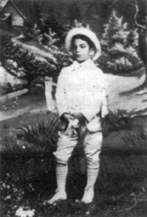 Luís Gonzaga Gomes, eight years old.
First Holy Communion day, at the Sé (Cathedral).
Photography taken by "Man Fock" in 1915.
Luís Gonzaga Gomes, eight years old.
First Holy Communion day, at the Sé (Cathedral).
Photography taken by "Man Fock" in 1915.
On the 5th of October 1920, the first edition of the newspaper put together by the Liceu students entitled "Academia" was printed. Its founder was Pedro Correia da Silva (Paço d'Arcos). It was in this newspaper that Luís Gomes began his career as a writer, publishing an article on Benjamin Franklin; he was only fourteen at the time.
The life and work of eminent personalities drew his attention and, by following their examples, his life was determined to the extent that one day he himself rose to be one of those men notable for their talent, dedication and work. His other companions followed the same ideal; Joaquim Paço d'Arcos became a good poet and novelist; Manuel Bivar, who rose to be the Director of the Emissora Nacional (National Broadcasting); Pedro Paço d'Arcos also turned out to be a novelist and a poet.
After finishing his seventh year of the Liceu, he decided to deepen his knowledge of Chinese culture. He was admitted to the Repartição do Expediente Sínico (Department of the Chinese Bureau) and in a short time he was appointed as first interpreter.
His appointment confirms his exceptional talents which were so soon revealed.
§3. THE TEACHER
Deeply influenced by his family, Luís Gomes followed the footsteps of the parents by lecturing as a primary school teacher, a profession he held for more than twenty years.
His teaching technique was so appreciated that he was appointed Director of his school — Escola Primária Oficial; "Pedro Nolasco da Silva" — and later was twice Inspector Substituto (under-Inspector) of the Primary Education.
Due to his knowledge of Chinese language, we was appointed Secretary of the Comissão da Elaboração do Regulamento do Curso de Lingua Chinesa (Commission for Elaboration of the Regulation of the Chinese Language Course) in the Liceu Nacional "Infante Dom Henrique", where he finally taught this language. An expert of the Chinese language, he always stood up for the teaching of this local language — and one of the most spoken languages in the world — to the Portuguese-speaking people of Macao. Even in this field, Luís Gomes showed his lucidity, for he saw how important it was for the Macanese to be able to write and have a proper command of the most spoken language in the territory. Unfortunately, some time later, the Chinese language was abolished from the curriculum of the Liceu.
The Administration of the Correios, Telégrafos e Telefones (Post Office, Wireless and Telephones) also hired him to teach Chinese and English to its personnel, a teaching activity that lasted for several years.
A decade after his death the School Prize "Luís Gonzaga Gomes" was set up as a deserving homage to the person who did his best for the education in Macao.
§4. THE MUSIC
The Motherland and the Music were the two great passions that stirred his soul. It can be said that both were inherited from his familiar genuine Macanese surroundings and, as such, also imbibed with a strong Portuguese cultural influence, as it was usual in the Macanese families of that time. Along with his elder sister, Maria Margarida, he learned how to play violin. Margarida had a great influence on Luís Gomes when he was still young, leading him naturally to love music, a subject she knew well.
Thus, Luís Gomes took out courses on Music Theory, solfeggio and History of Music in the Universal School of Paris. This music knowledge proved to be very important, because he later superintended the Círculo de Cultura Musical (Circle of Musical Culture) and invited Macao artists, singers, pianists and violinists, many of them internationally famous. They had greatly contributed to the development of music in Macao.
After each concert, his comments were published in the local newspaper: he did not lack either knowledge nor musical feeling.
In the Grupo de Amadores de Teatro e Música (Amateur Group of Theatre and Music), Luís Gomes was second violinist. He participated as a singer in various concerts and also in radio programs. His participation in the group was not limited to the musical performance, but also to the finances, for Luís Gomes was also the Treasurer.
Music was always present in his life, in such a manner that in his house there was a sound system carefully installed in a sound-proof room, besides hundreds of recorded tapes of classical music.
With such musical knowledge, it was not surprising that he had a prominent place in the artistic scene of the time. When the necessity arose for the installation of the Academia de Música (Music Academy), he was asked to become the Secretary of the Commission. He was also Director of the Emissora de Radiofusão de Macau (Radio Broadcasting Station of Macao).
§5. ETHNOGRAPHY
Ethnography as a 'Science' describing peoples, their customs and traditions, was an endless intellectual activity of Luís Gonzaga Gomes. He spent most of his energies studying his environment. It was like speaking about himself when he described Macao, day-by-day, its opium dens its 'tim-tins' [Chinese antiques' shops], the Temples, the rickshaws and jirinkishas, the coolies, the legends, and the ceremonies. For him 'son of the soil', it was a great pleasure to speak about Macao and its innumerable aspects, for he knew, better than nobody, the realities of Macao.
Because he could master the Chinese language in its spoken and written version, Luís Gomes managed to enter into traditionally hostile milieux or at least restricted to native non-Portuguese.
As such, his works are systematically organized memories of each beat of the city, from the hillsides to the alleyways, from the temples to the fortresses, from the soothsayers to the hawkers.
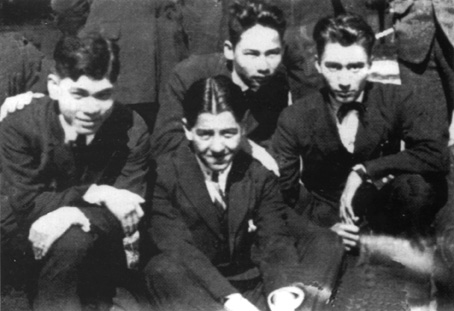 Luís Gonzaga Gomes some of his schoolfellows from Liceu.
The old Liceu (Secondary School) building still stands, being nowadays occupied by a District Heath Centre, in Avenida Conselheiro Ferreira d'Almeida.
Photograph taken around 1920.
Luís Gonzaga Gomes some of his schoolfellows from Liceu.
The old Liceu (Secondary School) building still stands, being nowadays occupied by a District Heath Centre, in Avenida Conselheiro Ferreira d'Almeida.
Photograph taken around 1920.
His perspective of the Macanese life, mainly of the Chinese legends and superstitions, is not dry and cool; on the contrary, it is witty and funny trying to sooth the ingenuity of the story.
The fact that Luís Gomes had worked, in order to make the Portuguese aware of the folklore, the legends, the traditions and the customs of China and, inversely, he tried to introduce to the Chinese people some of the Portuguese literary works, place him in a position of a not worthy cultural relativity.
Os Lusíadas contados às crianças 歷代葡國英雄的童年事跡 (The Lusiads narrated to Children) and the resumé of the História de Portugal 葡國歷史 (History of Portugal) in Chinese are some of his works.
§6. HISTORIAN
The novelist Joaquim Paço d'Arcos, recollecting his youthful days when he was a student of the Liceu in Macao, speaks with nostalgia of Luís Gomes: "Our colleague, the future and devoted historian of the Portuguese presence in Macao and in the East [...]."
In reality, Macao was not a hotbed for historians. In the course of his life, four times secular, only three of his 'sons of the soil' devoted to the study of its history: José Baptisata de Miranda e Lima, Carlos Augusto Montalto de Jesus and Luís Gonzaga Gomes. Accordingly, Fr. Manuel Teixeira says that the last was the greatest of all, not because he had published many treatises (he is the author of only one treaty Páginas da História de Macau (Events of the History of Macao) but due to hundreds of historical articles published in several newspapers of Macao and others. Fr. Teixeira emphasizes his idea, saying that if all the articles of Luís Gomes were compiled. then its publication would have revealed "the best and most prolific Macanese historian in four-hundred years of this land [...]."
Already with his high reputation, Luís Gomes was invited, in 1955, by the Governor Admiral Joaquim Marques Esparteiro (1951-1957) to make an inventory of all the existing documents in the Archives of Macao — with the exception of the Ecclesiastic one — a work that, although burdensome, was soon taken up. The work only stopped on the 28th of November 1961 when, for unknown reasons, General Jaime Silvério Marques, Governor of the colony at that time (1959-1962) gave that order.
However, the material compiled by Luís Gomes during those years of labour was not in vain, and later it was published in several volumes in the "Boletim da Filmoteca Ultramarina Portuguesa".
After the departure of Governor Joaquim Marques Esparteiro, Luís Gomes was entrusted to prepare a History of Macao. The Governor, Commander Pedro Correia de Barros (1957-1959), showed keen interest that it should be published. Luís Gomes was a man capable of undertaking such a work but once again, the departure of the Governor brought the work to a stoppage. Again he lost the opportunity to work on the history of Macao, a gap long felt in this subject. Without the clear support from the Government for the completion of such an important work, Luís Gomes was restricted to publishing his works in a haphazard manner in the local national newspapers and magazines.
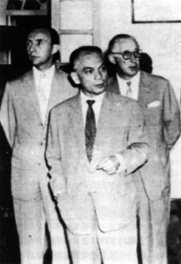 During the visit of the Governor Jaime Silvério Marques to the Museu Luís de Camões (Luís de Camões Museum).
Photograph taken on the 9th of November 1960.
During the visit of the Governor Jaime Silvério Marques to the Museu Luís de Camões (Luís de Camões Museum).
Photograph taken on the 9th of November 1960.
The publication of "Arquivos de Macau", was very often interrupted, which caused a great delay. In 1929, at the suggestion of Dr. Telo de Azevedo Gomes, a teacher in the Liceu, the publication was started up but, hardly after two years, the works were suspended and only three volumes were published. A decade later (1941), a faint effort was made, which extended the work for one more year under the management of Canon António Maria de Morais Sarmento.
The Pacific War interfered with the publishing of the "Arquivos de Macau", which had to be suspended for another twenty years. Luís Gomes had the honour to restart this long and unsteady course and restarted the publication in 1964. This time he could publish twenty-four volumes, without any break. To achieve that, Luís Gomes had to sacrifice his sleeping hours. About that, his friend Fr. Manuel Teixeira said in a gentle way that "Poor Luís" remained awake till late hours correcting the proof sheets.
But those were not the only activities of Luís Gomes. He was one of the founders and Director of the "Boletim do Instituto Luís de Camões", a publication that attracted a well-deserved reputation in Macao and abroad. Up till 1976, the year of his death, nine volumes were published, with three or four parts each, almost all containing an article of its Director.
From the works translated by Luís Gomes we should refer the book in Chinese entitled Ou-Mu Kei-Leok 澳門紀略 (Aomen Jilue) (Monograph of Macao) which was written by two civil servants of China who came to Macao in the sixteenth century.
This book is interesting for its historical notes and information. It gives us an insight into the Chinese administration in the earlier days in Macao when it was a trading post. The second part deals with foreigners in Macao, their habits, customs and language.
Despite the hard work, Luís Gomes presents a careful and commented translation. The translation shows a more than ordinary knowledge, revealing excellent qualities of work, intelligence and learning.
His work capacity and his spirit of sacrifice were well known. To prove it, it is enough to recall the time Luís Gomes spent collecting the heap of documents scattered in the riots of the 3rd of December 1966, which he then carefully and patiently restored. The Commission charged with the restoration work of the damaged manuscripts was composed by Luís Gomes, Fr. Manuel Teixeira and Fr. Benjamim Videira Pires. His own companions of the commission confirm this endless patience of Luís Gomes trying to restore the damaged manuscripts. With all these qualities, it is not surprising that he became the Secretary of the Comissão de Defesa e Valorização do Património Artístico e Histórico da Província de Macau (Commission for the Defense and Valorization of the Artistic and Historic Heritage of the Province of Macao).
On the 7th of March 1966, due to his activities and works on the history of Portuguese expansion in the world, he was appointed voter of the Centro de Estudos Históricos Ultramarinos (Centre of Overseas Historical Studies) of the Ministério do Ultramar (Overseas Ministry).
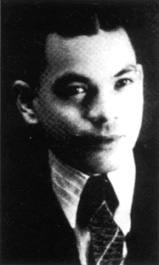 Luís Gonzaga Gomes
During the times when he worked as an interpreter at the Repartição Técnica do Expediente Sínico (Technical Office of the Government's Chinese Bureau).
Photograph taken around 1925.
Luís Gonzaga Gomes
During the times when he worked as an interpreter at the Repartição Técnica do Expediente Sínico (Technical Office of the Government's Chinese Bureau).
Photograph taken around 1925.
His reputation opened the door for several contacts with national and foreign personalities which, through the exchange of views and experiences, enriched his knowledge. Dr. Domingos Abella, the Philippine historian, visited him several times and kept in touch with him many times; many of the participants (about seventy) in the INTERNATIONAL HISTORY CONGRESS OF ASIA, who were in Macao in 1964, exchanged views with him on the history of the vast continent. The contact with Dr. António da Silva Rêgo proved very useful, his being an expert on Portuguese overseas history; with Jack Hintou, Prof. of the University of Singapore and an active member of three Departments of the Pacific History of the National University of Australia; with Prof. Akio Funakashi of the University of Kyoto; and with H. S. Williams, the author of numerous works on Japan. The latter worked for some days (1965) in the Biblioteca Nacional de Macau (National Library of Macao) where Luís Gomes was the Director.
All these contacts to which Luís Gomes was accustomed, undoubtedly contributed to the full development of his culture. He could be proud of having an 'Open School' with a high number of excellent 'teachers' in all subjects and from different nationalities.
The last work of Luís Gomes was ordered during the Government of Garcia Leandro and it presents a Summary of the History of Macau, which was used as a compendium in the local Portuguese schools. Dr. Túlio Tomás, his friend, has one copy of that work and he has sent it to the Instituto Cultural de Macau (Cultural Institute of Macao) for a new publication.
§7. THE CURATOR
At a very early age Luís Gomes had shown interest in artistic objects that could be found in Macao. He had already a sound knowledge on this subject and was the owner of a precious collection of Chinese art when Governor Marques Esparteiro (1951-1957) entrusted him with the task to install definitively the Museu Luís de Camóes (Luís de Camões Museum). His technical efficiency was proven in a relatively short time and, a few years later, when the Governor Jaime Silvério Marques (1959-1962) made his first visit to the Museum, he was received by Luís Gomes to whom he testified his admiration for the good work done.
His private collection of Chinese art was considered, by the experts, the best in Macao. This collection was acquired almost in its totality by a collector (maybe Spanish) for a very low price. This fact happened at a moment of saturation of Luís Gomes, when he saw so many things in confusion. but his sister kept a small part of the house for valuables that were sent to the Universidade Católica (Catholic University), [in Lisbon], a few time ago, as a gift of the Macao's Government.
As we have already mentioned, this illustrious Macanese succeeded in maintaining, during his active existence, several contacts. As Curator of the Luís de Camões Museum the connections he maintained along those years with some good specialists we can name: Michael Leigh, Curator and ethnologist of the Sarawak Museum, in Malaysia; John Warner, Curator of the City Hall Museum, in Hong Kong; Francis Bacon Bolthrops, of the Peabody Museum, Salem/Massachussets, U. S. A.: Senjora Toni Schmid, Curator at Upsala, in Sweden, author of many works on Lamaism and on the Tibetan language; and Philip Hoffer, Secretary of the Art Fogg Museum, Cambridge/Massachhussets, U. S. A.. A year after his death, the museum that he created and developed decided to pay him in homage by placing his bust in one of the halls.
§8. THE LIBRARIAN
Luís Gonzaga Gomes learned very early to value the books as instruments of culture. In a short time he became a book-lover and, later, a librarian of a recognized technical ability. The bibliographical series that, with patience and understanding, he was collecting in his house, formed one of the most valuable private libraries of Macao and today it belongs to the Arquivo Histórico de Macau (Historical Archive of Macao).
In 1962, he was the substitute librarian of Biblioteca Nacional, at that time installed in the building of Leal Senado. There, he unfolded a remarkable work, hardly known by the Macanese public. The biographical notes that were published and that we know of, do not mention this important phase in the activity of Luís Gomes. They only mention that he was a librarian of Biblioteca Nacional. The annual reports that he wrote as librarian and which we scrutinized, reveal valuable information about his activities between 1962 and 1967. His opinion about the situation he found in the Biblioteca Nacional and about the work he carried out there, is expressed in his following words: "During this year, we unpacked two hundred and thirty-two boxes of documents sent by Depósito Legal (Legal Deposit) and we ordered them alphabetically and by classes; we fixed the prices in order to make the entries in the Expenses Book; we made annotations, classifications and arrangements of eight-thousand-five-hundred-and-five varieties, contained in those boxes [...] we also unpacked thirteen-thousand-four-hundred-and-seventy-six books, we separated them by classes and we arranged them alphabetically [...]." All this work was done by himself because the employee of the Biblioteca was on leave in Portugal.
With the increase in tourism already forecast in the sixties, the Biblioteca Nacional de Macau attracted many visitors. Not only tourists brought by special agencies (for the guides did not have it in their tourist guide books), but also by interested travelers — what is known today, probably, as 'quality tourism' — who traveled by themselves and who had already heard of the Biblioteca Nacional, or, otherwise, its visit was recommended by those who had visited it before. It is in this context that Luís Gomes maintained contacts with several personalities of the cultural world, as for instance the eminent Spanish historian Fr. Diego Pacheco, S. J.; Conrad Brendt, of the Centre of Chinese Studies of the University of California, U. S. A.; Stephen Uhaley Jr., of The Asia Foundation; Prof. Antonio Scarpa of the University of Studies of Milan, Italy; etc.
The contact and the exchange of experience in the field of bibliothaconomy with people from other countries, was also very important for the strengthening of his knowledge on the subject. For the visitors, the information supplied by Luís Gomes was also very important, no matter if he spoke about the rare books of the Biblioteca Nacional, or about the historical facts of Macao he knew very well. Thus, among those foreign Librarians we could mention the following: Harold Charles Barraclough, Librarian of the National Library of Canberra, Australia; Joyce Wright, Assistant Director of the East-West Centre Library of Honolulu, Hawaii; J. P. Haimann, an employee of the Yale University Library of New Haven/Connecticut, U. S. A.; Ekse Grahn, the sinologist and Librarian of the Far East Section of the Kongelige Bibliotek, Købnhavn (Royal Library of Copenhagen).
Luís Gomes was a linguist — besides his mother tongue, he knew Chinese, English, French and Italian — which, allied to his vast learning, made him the ideal host of these numerous specialists that, from overseas came to this region. The Librarians were not the only ones looking for Luís Gomes, but also writers and journalists like Emile Marini; the Count Albrecht von Maran of "La Revue des Voyages"; the University professor of de La Salle College, in Manila; Stuart R. Scram, Director of the U. S. S. R. / P. R. China of the Fedération Nationale des Sciences Politiques (National Federation of Political Sciences), in Paris; etc.
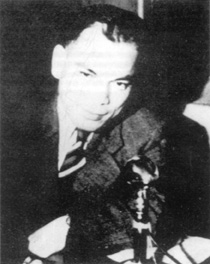
Luís Gonzaga Gomes speaking at the microphone.
In the Emissora "Radio Club" ("Radio Club" Broadcasting Station) which operated on the top floor of the Correios, Telégrafos e Telefones (Post Office, Wireless and Telephones) building.
Photograph taken in the Thirties.
The Decreto (Law) number 46.845, published in the "Boletim Oficial de Macau" on the 14th of February 1966, recognized Luís Gomes, definitively, as the Librarian of the Biblioteca Nacional de Macau and confirmed publicly his value and competence.
A month later, on the 25th of March, Luís Gomes went to Portugal to participate in the 2. ° ENCONTRO DE BIBLIOTECÁRIOSE ARQUIVISTAS PORTUGUESES (SECOND MEETING OF PORTUGUESE LIBRARIANS AND ARCHIVISTS), A congress which had an attendance of two hundred and fifty National Librarians and Archivists.
At the end of the session of the 2nd of April the General Director for the Overseas Studies, Dr. Justino Mendes de Almeida, made a speech and said the following: "In this meeting we have already considered the representation of Cape Verde and Macao (this opportunely and rightly entrusted to Mr. Luís Gonzaga Gomes, an example of a complete dedication to the publishing of the existing documents in the territory. To prove this assertion we have the publishing of "Arquivos de Macau" which are the result of his work." Furthermore, the speaker in referring to the Biblioteca Nacional whose Director was Luís Gomes said: "The other example is the Biblioteca Nacional de Macau, situated in the building of Leal Senado, which consists of over sixty thousand bibliographical varieties, presently enriched with the integration of the library of the former Repartição Técnica do Expediente Sínico (Technical Department of the Chinese Bureau).
As I had the opportunity to refer, the Province of Macao is a real example not only of the preservation of part of the documental heritage of the country, but also of its use to further the studies of historical research and the cultural enrichment of the people. The valuable publications that we regularly receive, lead us to hope that this example spreads to other places of the national territory." (Relatório da Biblioteca Nacional de Macau, 1966).
Due to his reputation, talent and dedication to work, Luís Gomes was granted the exceptional honour of taking the chair on the 2nd day of the 2. ° ENCONTRO dedicated to the theme "Technical Assistants" which lasted the whole day in Palácio Foz, the seat of Secretariado Nacional de Informação (National Broadcasting Secretariat).
On his return to Macao, Luís Gomes resumed his work in Biblioteca Nacional, fighting continuously for more space, as the Biblioteca was getting full with the new arrival of documents. After 1963, he noticed the necessity of acquiring a new building, suitable and well equipped, to properly install the Biblioteca. A year later, thanks to the support of Governor Lieutenant-Colonel António Adriano Lopes dos Santos (1962-1966), the Biblioteca was extended with one more hall, relatively large, where thousands of bibliographical varieties were then placed. Before, they did not have a place to put and arrange them systematically.
Despite the necessity to extend the installations of the Biblioteca, Luís Gomes faced, a year later, serious problems with the disposal of bibliographical varieties which had been constantly pouring into the Biblioteca, under the Decreto of Depósito Legal, since 1952.
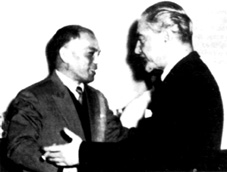
Luís Gonzaga Gomes with Dr. Hermann Machado, owner of the Macao daily "Notícias de Macau".
Photograph taken on the 31st of December 1958.
In his Report referring to the year 1965, Luís Gomes said about this old problem: "[...] we need urgently another building to install the Biblioteca Nacional, because there is neither enough space for an extension, nor it is possible to accommodate more bookracks in the rooms available [...] the choice of one adequate place for a new building is also a problem because of the great urban development the City is facing. So I suggest [...] the adaptation of the building where the Secretaria da Repartição dos Serviços de Saúde (Offices of the Government Heath Services) is presently installed, that is, in the old Liceu, in Rua Conselheiro Ferreira de Almeida; it is ideal because it is central, easily accessible and with sufficient rooms to serve as a Library."
Luís Gomes proved to be a man of vision and an able technician, when considering all the problems caused by the eventual change are extension of the Biblioteca Nacional de Macau to another building. Although the new building where the Biblioteca was going to be installed, two decades later, was not the intended one, the place was exactly the same. Nowadays, the Biblioteca is situated near the Serviços de Saúde. There is an ancient book section of the Biblioteca in the building of Leal Senado.
§9. CONCLUSION
Luís Gomes, this subtle man, who never spoke of himself and did not reveal in his works his personal life was perhaps "[...] the most remarkable and interesting Macanese personalitty of recent times [...]" according to Dra. Graciete Batalha. With no family, he used all his energy in several fields, namely the cultural, the administrative, the musical, and the sportive. Therefore, he wrote innumerable articles and monographs (as author or translator) [...]. Besides this he was also Editor-in-chief of the magazine "Renascimento", Administrator of the journal "Renascimento", Secretary-General of the daily "Notícias de Macau", Secretary of the Círculo Cultural de Macau (Cultural Circle of Macao), President and Secretary of the Rotary Club of Macao, Vice-President of the Comissão Administrativa do Leal Senado da Câmara (Administrative Commission of the Leal Senado of the Municipality), voter in the first Comissão de Defesa do Património (Commission for the Safeguard of the National Heritage) created by order of the Governor Nobre de Carvalho — his knowledge of Macao had contributed in a special way to organize the first list of the buildings which must be preserved —, voter in the Câmara da Comissão das Terras (Chamber of the Land Commission), voter in the Câmara da Comissão de Assistência (Chamber of the Welfare Commission), violinist and singer, and Secretary of the Associação Desportiva Macaense (Macanese Sports Association) and União da Associação Desportiva Macaense (Union of the Macanese Sports Association). He also played tennis in Hong Kong, many times as a representative of Macao.
So much activity prevented him from becoming a good writer and a methodical and critical historian. It also prevented him from being an accomplished sinologist or an extraordinary musician. Despite all this and taking into account his natural human limitations, Luís Gomes left a work of unquestionable merit. He left to the coming generation a many-faceted contribution reflecting life in Macao, with its Portuguese, Chinese and Macanese components. To quote Dra. Graciete Batalha, Luís Gomes left"[...] although in fragments a multicoloured panoramic view [...] of life in Macao — Portuguese Macao, Chinese Macao, Macanese Macao." **
Translated from the Portuguese by: Helena Évora
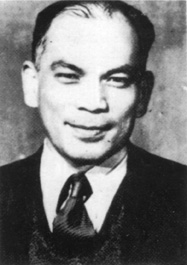
Luís Gonzaga Gomes.
Photograph taken in the early Sixties.
**Revised reprint from: ARRIMAR, Jorge de Abreu, Apontamento Biográfico / Biographical Notes, in: "Exposição Fotobibliográfica: Photobibliographical Exhibition: Luís Gonzaga Gomes", Macau, Instituto Cultural de Macau -Biblioteca Nacional - Arquivo Histórico, 1987, pp. 3-26.
*BA in History. Authority on Documentation. Director of the Central Library of Macao.
start p. 122
end p.